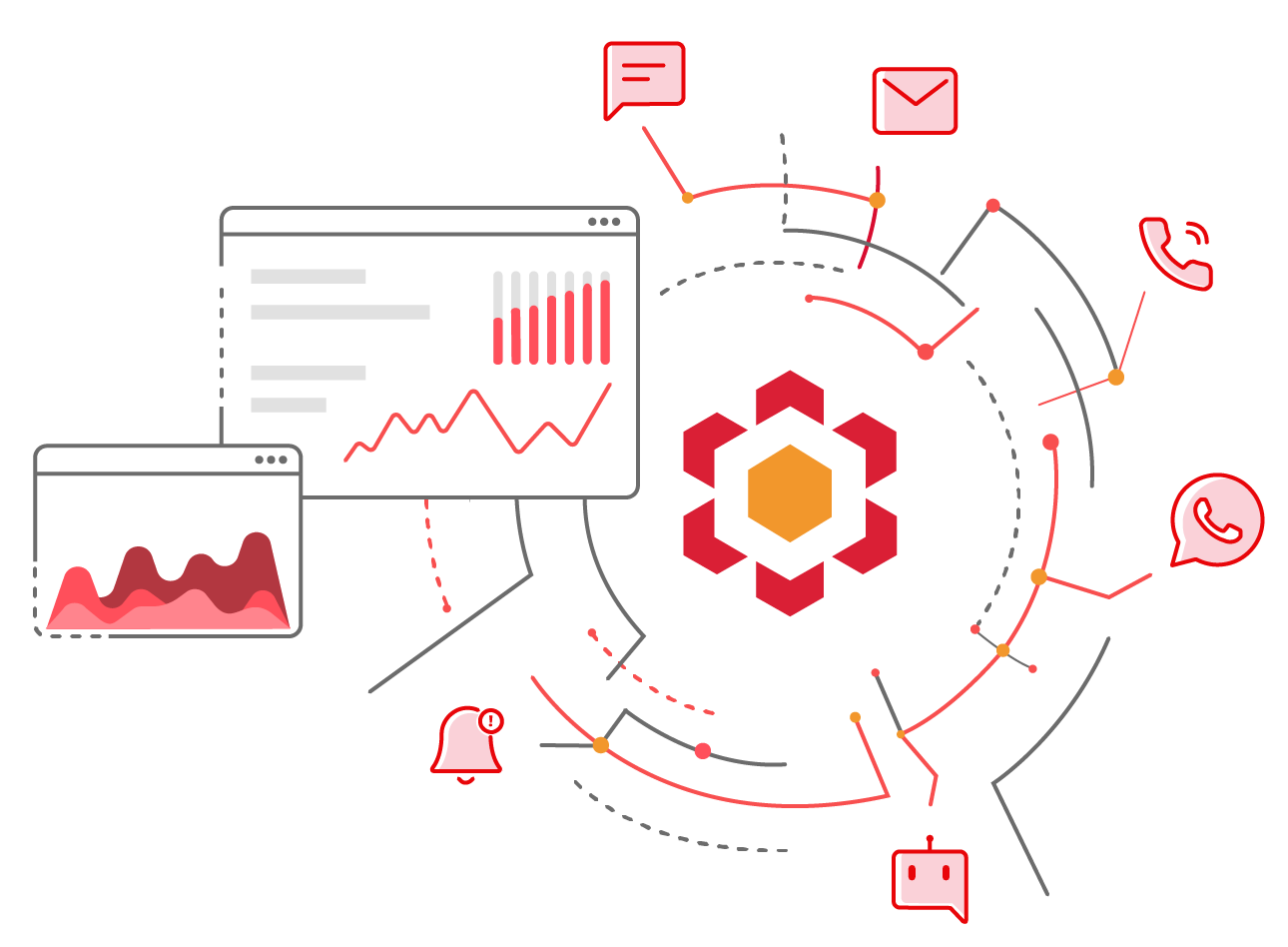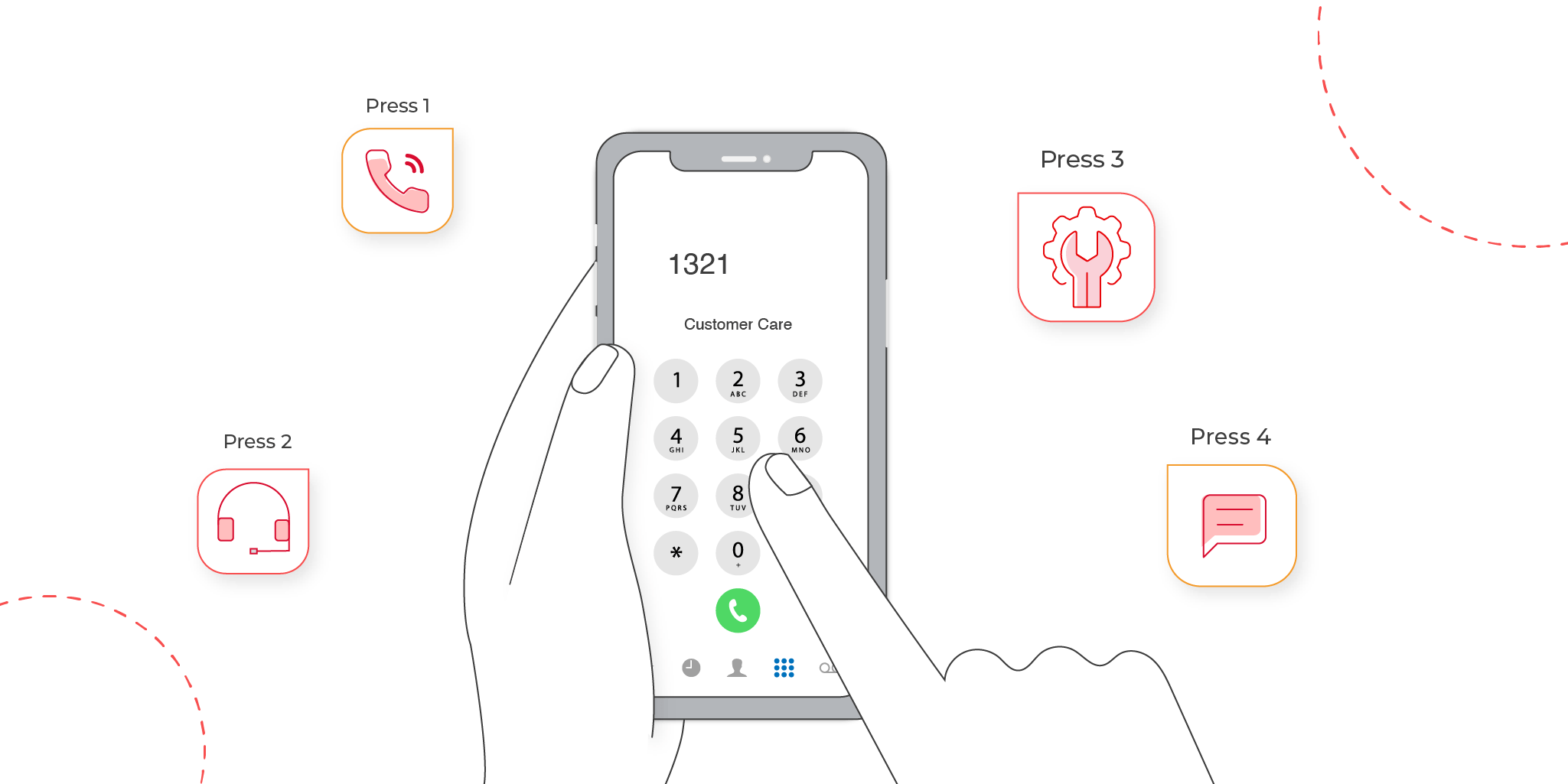As a business, you know that operational efficiency and cost-effectiveness are crucial for success. One area where you can make significant strides is in managing customer interactions. Interactive Voice Response (IVR) technology offers a powerful solution, allowing you to streamline communication processes, optimize resource allocation, and improve overall productivity without compromising the quality of customer service.
Far from the outdated notion of rigid phone trees, modern IVR solutions offer a sophisticated blend of automation and intelligence, empowering businesses to optimize their operations while exceeding customer expectations.
This blog post explores how IVR technology works, the range of benefits it offers, and how it can be implemented to enhance your customer service strategy.
Key Use Cases
IVR technology offers a versatile toolkit for businesses seeking to enhance customer interactions and optimize their operations. Here are some practical applications of IVR that showcase its ability to streamline communication and improve efficiency across various touchpoints.
Call Routing
Call routing is the heart of any modern phone system, acting as the intelligent traffic director for incoming calls. It goes beyond simply connecting a caller to an available agent. Instead, it involves a set of pre-defined rules and strategies that determine the most efficient and effective path for each call, ensuring it reaches the right person or department instantly.
Think of a busy office with different departments like sales, support, and billing. Without call routing, every call would land on a general line, leading to frustrated callers being transferred multiple times.
Call routing eliminates this chaos by:
Analyzing caller information: This could include the caller’s phone number to identify their location or account details, the dialed number to identify the department, or even the reason for calling gathered through an IVR system.
Applying routing rules: Based on the gathered information, the system applies pre-set rules to determine the best destination. This could be a specific agent, a team skilled in handling the identified need, or even a voicemail box outside of business hours.
How IVR Enhances Call Routing
Interactive Voice Response (IVR) systems act as intelligent gatekeepers, playing a crucial role in enhancing call routing:
Self-Service Options: IVR allows callers to interact with the system through predefined menus, often resolving simple inquiries without needing an agent. This frees up agents to focus on more complex issues.
Intelligent Call Qualification: Through voice prompts or keypad entries, IVR can gather crucial information about the caller’s needs before routing the call. This ensures the call is directed to the most appropriate agent or department from the outset.
Personalized Routing: By integrating with CRM systems, IVR can access customer data and tailor the call flow accordingly. For example, a high-value customer might be prioritized and routed to a dedicated team for premium service.
Agent Escalation
In an ideal world, every customer interaction would be resolved quickly and efficiently by the first agent they reach. However, the reality is that some issues are too complex, require specialized knowledge, or even demand a higher level of authorization to resolve. This is where agent escalation comes into play.
Agent escalation is the process of transferring a call to a more qualified or authorized agent who can better address the caller’s needs. This could involve:
Technical Expertise: Escalating a complex technical issue from a general support agent to a specialist with in-depth knowledge of the product or service.
Decision-Making Authority: Routing a customer requesting a refund or exception to a supervisor with the power to approve such requests.
De-escalation: Transferring an irate or frustrated caller to a manager or specially trained agent skilled in conflict resolution.
Failing to escalate calls appropriately can lead to customer frustration, wasted time, and ultimately, a negative brand experience.
How IVR Gathers Context for Seamless Agent Escalation
IVR plays a crucial role in ensuring seamless agent escalation by gathering vital context before the call reaches a human agent. This information can be used to:
Identify the Reason for Calling: Through menu options or voice prompts, IVR can determine the nature of the caller’s issue, allowing the system to route the call to the appropriate agent level from the start.
Collect Relevant Data: IVR can prompt the caller for their account number, order ID, or other relevant information that the agent will need to access their records and understand the situation quickly.
Gauge Urgency: By offering options related to the severity of the issue, IVR can help prioritize urgent calls and ensure they are escalated quickly to minimize potential negative impact.
This pre-collected information is then passed on to the agent upon call transfer, eliminating the need for the customer to repeat themselves and ensuring a smoother, more efficient experience.
The Role of IVR in Improving Agent Efficiency
By gathering context and streamlining the escalation process, IVR significantly contributes to improving agent efficiency:
Reduced Handling Time: Agents receive calls equipped with the necessary information, allowing them to quickly understand the issue and provide relevant solutions, ultimately reducing the overall call duration.
Increased First-Call Resolution: Routing calls to the right agent level from the outset increases the likelihood of resolving the issue on the first attempt, minimizing the need for further transfers and improving customer satisfaction.
Enhanced Agent Focus: By handling initial information gathering and call qualification, IVR frees up agents to focus on their core responsibilities – solving problems and providing excellent customer service.
Self-Service Automation
Self-service automation empowers customers to find information, complete tasks, and resolve issues independently, using technology instead of relying on human assistance. This approach not only caters to the growing demand for instant gratification but also offers businesses a way to streamline operations and optimize resource allocation.
Various Self-Service Tasks Facilitated by IVR
IVR stands as a powerful tool for enabling self-service automation. Through a combination of pre-recorded voice prompts, touch-tone inputs, and increasingly, natural language processing, IVR systems can facilitate a wide range of tasks, including:
Order Processing: Customers can place orders, track shipments, and even process returns without needing to speak to a live agent.
Bill Pay: IVR systems can securely process payments, provide account balance information, and even set up payment plans, offering customers 24/7 access to their billing needs.
Appointment Scheduling: From booking doctor’s appointments to reserving seats at a restaurant, IVR can integrate with scheduling systems, allowing customers to view available slots and confirm appointments instantly.
Information Retrieval: Customers can access FAQs, account details, store locations, and other relevant information through a simple and intuitive menu-driven system, eliminating the need for lengthy calls or website searches.
Impact of Self-Service Automation on Customer Satisfaction
When implemented effectively, self-service automation can significantly enhance customer satisfaction by:
Increasing Convenience: Customers can access services and information at their own pace, 24/7, without being constrained by business hours or agent availability.
Reducing Wait Times: By automating routine tasks, IVR systems free up agents to handle more complex issues, reducing hold times for customers who do require human assistance.
Empowering Customers: Self-service options give customers a sense of control over their interactions, allowing them to find solutions on their own terms.
Personalizing Experiences: With integration capabilities, IVR systems can personalize the self-service experience by accessing customer data and tailoring prompts and information accordingly.
AI Virtual Agents
Unlike traditional IVR systems that rely on rigid menu-driven interactions, AI virtual agents can interpret complex language, remember previous interactions, and learn from each conversation to improve their responses over time.
This allows them to handle a wider range of inquiries, provide more personalized support, and deliver a more human-like experience.
How IVR Integrates with AI to Provide Conversational Experiences
The integration of AI with IVR systems is key to creating truly conversational self-service experiences. Here’s how it works:
Speech Recognition: AI-powered speech recognition allows callers to interact with the system using natural language instead of navigating through keypad menus.
Natural Language Understanding: NLU enables the system to interpret the caller’s intent, even if they use colloquialisms, slang, or incomplete sentences.
Contextual Awareness: AI virtual agents can remember past interactions and access customer data to provide personalized responses and tailor the conversation accordingly.
Dialogue Management: AI algorithms manage the flow of the conversation, asking clarifying questions, providing relevant information, and even anticipating the caller’s needs.
Seamless Escalation: If the AI virtual agent is unable to fully resolve the issue, it can seamlessly transfer the call to a human agent, providing all the context gathered during the interaction for a smooth handover.
Benefits of Using AI Virtual Agents in Customer Service
The use of AI virtual agents in customer service offers numerous benefits:
24/7 Availability: AI virtual agents can provide round-the-clock support, handling inquiries and resolving issues even outside of business hours.
Increased Efficiency: By automating routine tasks and resolving common queries, AI virtual agents free up human agents to focus on more complex and nuanced interactions.
Cost Savings: Deploying AI virtual agents can reduce the need for large call center teams, leading to significant cost savings in the long run.
Improved Customer Satisfaction: AI-powered interactions offer faster resolutions, personalized experiences, and consistent service quality, leading to higher customer satisfaction rates.
Data-Driven Insights: AI virtual agents collect valuable data on customer interactions, providing insights into common pain points, customer preferences, and areas for improvement.
Proactive Notifications
While often associated with handling incoming calls, IVR technology also plays a crucial role in proactive customer communication through automated outbound notifications. This shift from reactive to proactive communication allows businesses to engage with customers on important matters, keeping them informed and enhancing their overall experience.
IVR systems achieve this by leveraging pre-recorded messages and text-to-speech capabilities to deliver timely and relevant information directly to customers’ preferred communication channels, whether it’s their phone, voicemail, or even SMS.
Proactive notifications can cover a wide range of scenarios, including:
Appointment Confirmations: Reduce no-shows and streamline scheduling by automatically reminding customers of upcoming appointments, allowing them to confirm or reschedule as needed.
Account Updates: Keep customers informed about important changes to their accounts, such as password resets, billing cycles, or upcoming renewals.
Delivery Details: Provide real-time updates on order shipments, including estimated delivery times, tracking information, and potential delays, keeping customers informed and reducing anxiety about their purchases.
Payment Reminders: Gently remind customers about upcoming payments, reducing the risk of late fees and potential service disruptions.
Promotional Offers: Inform customers about exclusive deals, new product launches, or personalized recommendations based on their purchase history.
Emergency Notifications
Whether it’s a natural disaster, a security threat, or a critical system outage, businesses and organizations need a way to reach their stakeholders quickly and efficiently. Traditional communication channels like email or social media may not be reliable or fast enough in such situations, highlighting the need for a more robust solution.
How IVR Simplifies Emergency Communication at Scale
IVR technology offers a powerful platform for delivering emergency notifications effectively and at scale. Here’s how:
Wide Reach: IVR systems can simultaneously contact thousands of individuals, ensuring that critical information reaches a broad audience within a short timeframe.
Multiple Channels: Beyond voice calls, IVR can leverage SMS, voicemail, and even push notifications to reach individuals through their preferred communication channels.
Targeted Messaging: Pre-recorded messages can be customized based on recipient groups or locations, ensuring that individuals receive relevant and actionable information.
Two-Way Communication: IVR can be used to not only broadcast messages but also gather responses, allowing organizations to assess the situation, track responses, and provide further instructions.
24/7 Availability: IVR systems operate round-the-clock, ensuring that critical information can be disseminated immediately, regardless of the time of day or day of the week.
Impact of IVR-Facilitated Emergency Notifications on Customer Experience
During emergencies, clear and timely communication can significantly impact customer experience, even amidst challenging circumstances:
Reduced Anxiety: Receiving prompt and accurate information helps alleviate fear and uncertainty, providing reassurance that the situation is being addressed.
Enhanced Safety: Timely instructions and updates enable individuals to make informed decisions and take appropriate safety precautions.
Increased Trust: Proactive communication during emergencies demonstrates that businesses prioritize the well-being of their customers, strengthening brand loyalty even in difficult times.
Improved Response Coordination: Two-way communication capabilities allow for real-time feedback and coordination, facilitating a more effective response to the emergency.
In Summary
IVR solutions offer a powerful and versatile approach to streamlining customer interactions, empowering businesses to enhance efficiency, elevate customer experiences, and drive significant cost savings.
From intelligent call routing and self-service automation to proactive notifications and emergency communication, IVR technology provides the tools needed to create a seamless and satisfying customer journey. By embracing the capabilities of IVR, businesses can unlock new levels of operational efficiency, build stronger customer relationships, and gain a competitive edge in today’s dynamic marketplace.

Harish Thyagarajan
Content Marketer
Supercharge Your Communication!
Get in touch with our experts who strive hard to bring the very best in cloud communications technology to you.


